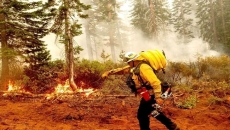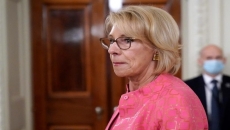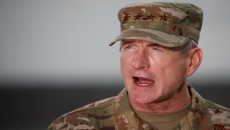The U.S. is recommending a "pause" in administration of the single-dose Johnson & Johnson COVID-19 vaccine to investigate reports of potentially dangerous blood clots.
In a joint statement Tuesday, the Centers for Disease Control and Prevention and the Food and Drug Administration said they were investigating clots in six women that occurred in the days after vaccination. The clots were observed along with reduced platelet counts — making the usual treatment for blood clots, the blood thinner heparin, potentially “dangerous.”
More than 6.8 million doses of the J&J vaccine have been administered in the U.S., the vast majority with no or mild side effects.
The vaccine was approved for use in Canada in early March, with the federal government saying it had pre-purchased 10 million doses, with options to buy another 28 million.
So far, no doses have been delivered and it's unclear when the first shipment will arrive. Health Canada could not immediately be reached for comment Tuesday regarding the U.S. recommendation.
U.S. federal distribution channels, including mass vaccination sites, will pause the use of the J&J shot, and states and other providers are expected to follow. The other two authorized vaccines, from Moderna and Pfizer, are not affected by the pause.
CDC's Advisory Committee on Immunization Practices will meet Wednesday to discuss the cases and the FDA has also launched an investigation into the cause of the clots and low platelet counts.
"Until that process is complete, we are recommending a pause in the use of this vaccine out of an abundance of caution," Dr. Anne Schuchat, Principal Deputy Director of the CDC and Dr. Peter Marks, director of the FDA’s Center for Biologics Evaluation and Research said in a joint statement.
They are recommending that people who were given the J&J vaccine who are experiencing severe headache, abdominal pain, leg pain, or shortness of breath within three weeks after receiving the shot contact their health care provider.
Officials say they also want to educate vaccine providers and health professionals about the "unique treatment" required for this type of clot.
The J&J vaccine received emergency use authorization from the FDA in late February with great fanfare, with hopes that its single-dose and relatively simple storage requirements would speed vaccinations across the country. Yet the shot only makes up a small fraction of the doses administered in the U.S. as J&J has been plagued by production delays and manufacturing errors at the Baltimore plant of a contractor.
Last week the drugmaker took over the facility to scale up production in hopes of meeting its commitment to the U.S. government of providing about 100 million doses by the end of May.
Until now concern about the unusual blood clots has centred on the vaccine from AstraZeneca, which has not yet received authorization in the U.S. Last week, European regulators said they found a possible link between the shots and a very rare type of blood clot that occurs together with low blood platelets, one that seems to occur more in younger people.
The European Medicines Agency stressed that the benefits of receiving the vaccine outweigh the risks for most people. But several countries have imposed limits on who can receive the vaccine; Britain recommended that people under 30 be offered alternatives.
But the J&J and AstraZeneca vaccines are made with the same technology. Leading COVID-19 vaccines train the body to recognize the spike protein that coats the outer surface of the coronavirus. But the J&J and AstraZeneca vaccines use a cold virus, called an adenovirus, to carry the spike gene into the body. J&J uses a human adenovirus to create its vaccine while AstraZeneca uses a chimpanzee version.
The announcement hit U.S. stock markets immediately, with Dow futures falling almost 200 points just over two hours before the opening bell.






